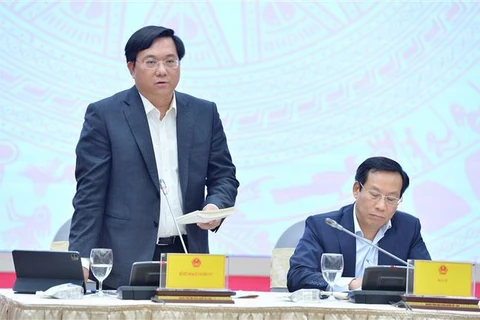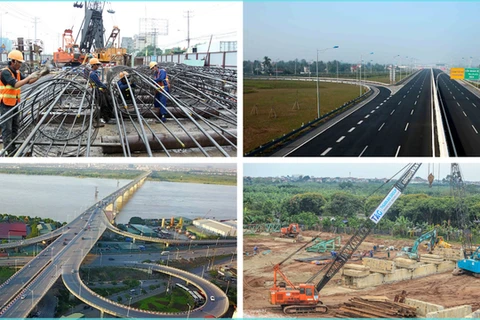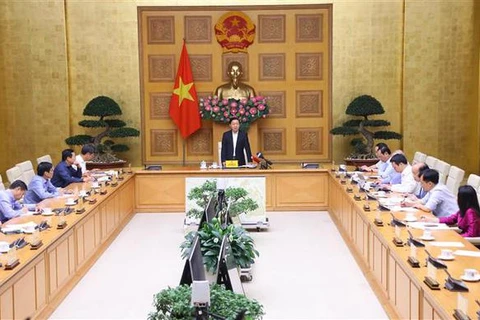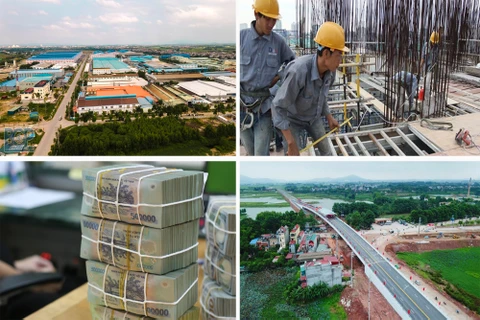Hanoi (VNA) - Accelerating public investment disbursement, particularly for National Target Programmes, would bolster aggregate demand and foster short-term economic growth, according to a report published by the World Bank (WB) on June 19.
In its June edition on Vietnam Macro Monitoring, the WB said Vietnam's economic growth continued to face challenges which were seen in a slowdown in industrial production and declining exports due to weak external demand and global uncertainties.
The industrial production index (IIP) registered a meagre 0.1% year-on-year increase in May, down from 0.5% in April.
The significant weakening of the IIP is primarily attributed to a contraction in manufacturing, including textiles, footwear, wood and paper industries, electronics, machinery, motor vehicles, and furniture.
The country’s Manufacturing Purchasing Managers’ Index (PMI) dropped to 45.3 in May from 46.7 in April, signaling a third successive monthly deterioration in operating conditions.
In contrast, retail sales remained robust, expanding by 11.5% year-on-year, mirroring the growth rate seen in April.
While sales of goods improving from 9.7% year-on-year in April to 10.9% in May, sales of services experienced a significant decline, dropping from 19.2% year-on-year in April to 7.6% in May, reflecting the impact of prevailing uncertainties on consumer spending.
The slowdown of growth in tourism and accommodation services is said to be the reason behind the decline.
Vietnam welcomed about 4.6 million international visitors in the first five months of 2023, up 11.6% compared to the same period last year, but 37% lower than the pre-pandemic level.
In terms of trade, exports of goods faced a significant setback, declining by 6% compared to the previous year, primarily due to weak external demand.
Most major production sectors continued to experience a contraction in exports during May. The garments and footwear exports fell by 16.7% and 5.4% respectively compared to the same period, while the exports of computers, machinery, and smartphones decreased by 11.4%, 6.4%, and 5.2% respectively, year-on-year.
Simultaneously, imports fell by 18.4% year-on-year in May, reflecting the prolonged slowdown in demand for foreign inputs necessary for production and exports.
Amidst these economic challenges, the consumer price index (CPI) revealed inflation declined for the fourth consecutive month. In May, the CPI softened from 2.8% year-on-year in April to 2.4% year-on-year in May, driven by falling global energy prices and a decrease in domestic transport costs.
However, core inflation remained elevated at 4.5% year-on-year in May, marginally lower than April's rate of 4.6% year-on-year.
Foreign direct investment (FDI) commitments also slowed down last month due to prevailing global uncertainties, weighing on investor confidence. However, FDI disbursement remained stable at 1.8 billion USD in May, comparable to the same period the previous year.
To stimulate the economy, the State Bank of Vietnam (SBV) took measures to ease monetary policies. The refinancing interest rate was lowered from 5.5% to 5%, and the overnight lending facility rate was reduced from 6% to 5.5%. This marks the third consecutive rate cut since March 2023.
“However, authorities must remain vigilant to potential pressures on capital flows and the exchange rate resulting from diverging monetary policies between Vietnam and other countries,” WB’s analysts suggested.
Prioritising investments in digital and green technologies, infrastructure development and human capital would promote sustainable long-term development, the bank said.
As manufacturing exports had slowed and employment in manufacturing had been affected, it would be important to quickly identify and support impacted workers and families through the social protection system. Streamlining administrative procedures and removing regulatory hurdles would help promote business activities and investments needed for economic growth, it added./.


























